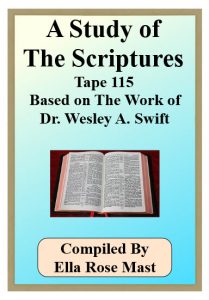A Message For Today (From The Ancient Psalms)
OVER THE YEARS MANY FACTS HAVE BEEN LOST PERTAINING TO OUR FAITH. Our Scripture tells us that this would happen. Older authors help us to find some of these truths. E. W. Bullinger in 1909 published his book, ‘Studies of the Psalms’. He believed that because of the translations of the Psalms in different versions of Scriptures, that people were missing some of the great meanings of words found there, and would not understand the use made of these great Psalms. Dr. Bullinger quoted Dr. Thirtle, who quoted the late Franz Delitzsch an earlier author as saying there were special words in the Titles of the Psalms for which the meanings had been lost, even as far back as the time when the Septuagint was written.
All agree however that these Titles formed a part of the Sacred Text, and were connected in some way with the use of these Psalms in the Tabernacle and Temple worship of the Israelites.
The Companion Bible used Dr. Thirtle’s key as they put together their translation of the Psalms. Dr. Thirtle believed that the reason for such poor translation is because those who go back in time for their evidence seldom go far enough back. He believes that you must leave the modern professors or interpreters and go on back to the oldest manuscripts, to the earliest Hebrew Bible available. In modern Hebrew the Psalms have been broken up while in the older Hebrew there is no break or space between the lines of the Psalms.
As an example Dr. Thirtle calls attention to the 3rd., chapter of Habakkuk. In this Psalm you find the title proper: ‘A Prayer of Habakkuk’, the Prophet, upon ‘Shigionoth’, which means ‘Crying Aloud’. You then find the Psalm proper in verse 2:19. At the end of this Psalm or prayer you find these words: ‘To the chief singer on my stringed Instruments’. In the older version this read: .’To the chief musicians of Neginoth’, meaning Music.
In the King James Version this was found at the first of Psalms No.4., but it is actually the end of Psalm 3. Thus Psalms 3, 5, 53, 60, 66, and 75 and Habakkuk 3., are Music Psalms according to the Law. The word Neginoth is from the Hebrew meaning ‘to strike’, thus these are those for the stringed musical instruments which were used in the worship service of Israel.
